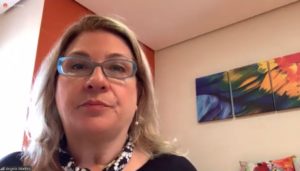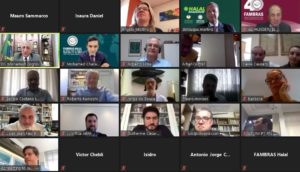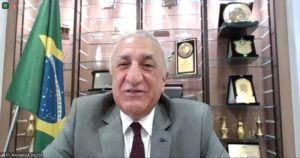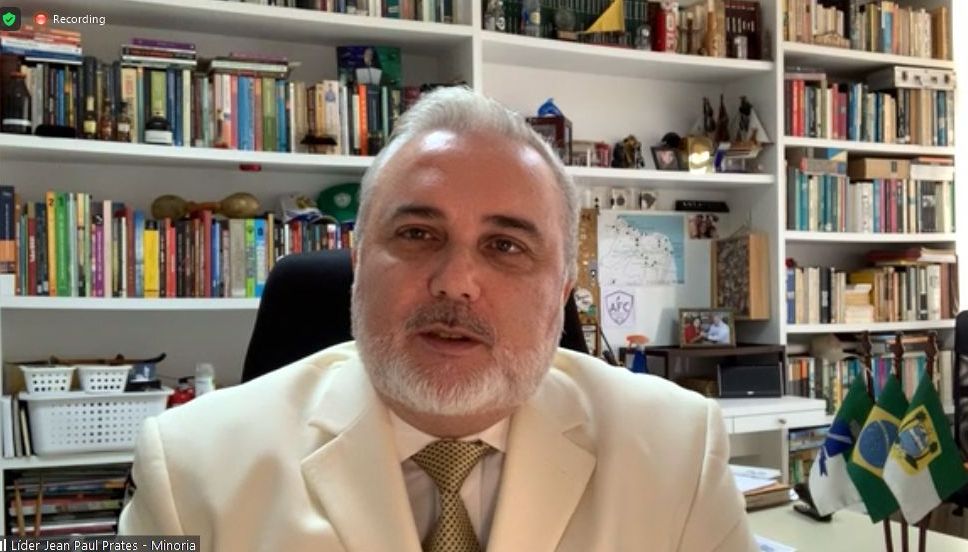São Paulo – Discussions will begin in Brazil’s legislative branch on a legal framework for Islamic finance. The news was disclosed this Thursday (15) by senator Jean Paul Prates during an online Halal Roadshow (pictured above) hosted by the Brazilian Halal Academy. Prates said he requisitioned on Wednesday (14) a public hearing on the topic at the Senate’s Commission on Economic Affairs.
There are banks in Brazil that operate in Islamic finance. However, the lack of regulation and of an understanding of said operations from financial authorities is an issue. During the Halal Academy event “Islamic Finance – Business Opportunities,” several speakers said regulation could be an important tool in attracting Islamic investors.

First Abu Dhabi Bank chief representative and Latin America manager Angela Martins explained the major differences between Islamic and conventional finance. “Islamic financial operations cannot involve uncertainty or unnecessary risk. Therefore, speculation is completely out of the picture. Islamic financial operations must observe clarity, transparency and simplicity,” she said.
Interest is prohibited, but profit is allowed – it must, however, be shared, as does risk. “The bank cannot simply be an entity that uses cash to derive advantages.” Martins also said operations and profit must add value to society and create opportunities.
In export financing, for instance, the bank becomes directly involved with the goods at hand and assumes the risk alongside the other parties. “The bank’s role is to make the purchase upfront from one party and then sell in instalments to the other party,” Martins explains. In Brazil, however, such transaction would imply tax payments on both the purchase and the sale. “This alone would kill the operation.”
Martins believes Brazilian financial authorities must understand Islamic finance so operations can be streamlined. Islamic banks manage USD 3 trillion between them, and according to her, that is reason enough to tap into this market. “It would make no sense for us to just be a secular, Christian majority country without any involvement with Islamic countries, which is not the case, since we are the biggest halal protein producing country in the world.” Islamic investment could target the halal industry.
Discussing a framework
Angela Martins, one of the foremost Islamic finance specialists in Brazil, worked for another Arab bank prior to joining First Abu Dhabi Bank. She has been called on to join the public hearing, alongside Central Bank, Securities and Exchange commission and Federal Revenue Service officials. “What we want is to promote a discussion of the regulatory framework, Prates said during the roadshow.

The senator believes the work will entail changing technical definitions, incorporating a new lexicon into Brazilian law, outlining the jobs of regulatory bodies, creating new instruments and procedures and looking into public contracts, among other things. Prates said there have been talks with the president of the Federation of Muslim Associations in Brazil (Fambras), Mohamed Zoghbi, towards creating create a parliamentary group and different organizations to figure out what needs changing in Brazilian law.
“Let’s start the debate, let’s kick off these discussions,” said Prates. Federal congressman Arnaldo Jardim, who chairs the Brazil-Arab Parliamentary Front consulting board, made himself available to advance the matter at the Chamber of Deputies alongside fellow congresswoman Ângela Amin, who’s the group’s first vice president and also joined the virtual roadshow.
Investment during the crisis
During the event, the undersecretary for Programs with Brazil’s Northeast Consortium, Sérgio Caetano Leite, recounted a successful experience that saw small and medium business owners in the state of Rio Grande do Norte get resources from a fund including Islamic investors, via overseas issuance of sukuk – a type of Islamic bond. Leite said the experience was presented to governors of Northeast states to show that Islamic finance can enable investment into the states and their industries.

Zoghbi discussed Prates’ disclosure that a group will be put in place to cooperate with the Parliamentary Front towards a legal framework. “Let us pave this road, to the benefit of Brazil,” he said. According to him, there are 1.9 billion Muslims in the world today, and there should be 2.6 million in 2060. Trade in halal goods grossed USD 4 trillion in 2019 and is expected to reach USD 6 trillion in 2024.
Several people involved with halal were featured in the roadshow, among them Arab Brazilian Chamber of Commerce (ABCC) secretary-general Tamer Mansour. Brazilian Animal Protein Association (ABPA) chairman Ricardo Santin discussed what halal represents to Brazil. “The only reason we got this far is because we took Islamic religion and halal certification very seriously from the get-go,” he said. Brazil is the biggest halal protein exporting country in the world. The roadshow was hosted by Halal Academy secretary-general Delduque Martins.
Translated by Gabriel Pomerancblum




